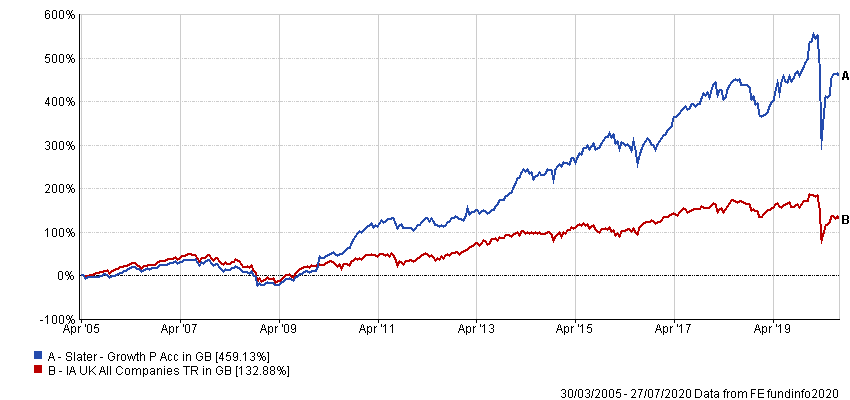Many of the best fund managers of the past 10 years focus on identifying what they call “great businesses” which they then buy and hold for the long term.
Yet what they actually mean by a “great business” is often difficult to pin down.
While there are some short-cuts, such as consistent growth and a strong return on equity, the managers’ definitions will often owe as much to qualitative factors as quantitative ones. This helps to explain why there is so little overlap between top performers such as Scottish Mortgage Investment Trust and Fundsmith Equity which both claim to focus on exceptional companies.
In an interview with piworld.co.uk, Slater Growth fund manager Mark Slater (pictured) agreed that what makes a great business is highly subjective, and in that way likened it to the famous phrase uttered by Potter Stewart, an associate justice of the US Supreme Court, when he was asked to define what constitutes hard-core pornography: “I shall not today attempt further to define the kinds of material I understand to be embraced within that shorthand description. But I know it when I see it.” 
“Sometimes you find a business, and you just know it’s a good business,” Slater explained.
“It almost leaps off the page. In essence, we like businesses where we can extrapolate growth as far out into the future as possible.
“What that means is that there’s something there that’s identifiable that gives that business some sort of tailwind. But that can come from lots of different areas.”
Slater’s strategy involves looking for companies that have the ability to make 50 to 100 per cent over three to five years, which is often a result of a growth in earnings and a subsequent re-rating of the share price. While he said there are a few cases where a stock sees this sort of appreciation in as little as six months, leading him to take profits, he said the evolution typically takes about four years.
However, there are some stocks in his portfolio that he has held for more than a decade, which are what he refers to as rare examples of “exceptional businesses”, and he said these need to be handled differently.
“What you’re looking for is a company that can compound your wealth and a lot of the companies we end up owning do that to different degrees,” he continued.
“But there are some that are just better and they’re very rare. They’re able to grow faster, they have much more runway, they’re much more special.
“It’s incredibly important to identify those companies. Everything we buy, we believe is good or very good at least, so we’re already pretty happy. But you always have a handful of companies that are just that little bit better. And as a growth investor, you’ve got to make that distinction.”
The manager said the reason why it is so important to make that distinction is giving these exceptional companies more “rope to run” is often what drives outperformance.
While he will sell out of a standard holding when it becomes fairly or fully priced, at most he will trim his position in an exceptional business as these will continue to improve. In this situation, he warned that taking profits too early can be as bad as missing the opportunity in the first place.
“If you’re too trigger-happy, you end up selling and then you want to buy back in in a year or two,” he said.
“And that creates a whole new level of challenges. Sometimes it’s difficult psychologically, that’s one thing, but also sometimes you can’t get the shares in the quantities you want.
“So, our view is you’ve got to very consciously make that distinction.”
In normal circumstances, Slater looks for companies that have a record of steadily increasing earnings growth, with little interest in loss-makers.
However, this has gone out of the window in the coronavirus crisis, with many otherwise outstanding businesses seeing their earnings completely dry up. Fortunately, he has been able to draw on his experience of the global financial crisis, when many strong companies understandably failed to deliver growth against the difficult economic backdrop.
“We’re taking the same view with Covid,” he said. “The fact that a company isn’t affected is interesting, but that doesn’t necessarily mean it’s brilliant and the fact that a company is badly affected for a year doesn’t mean it’s a bad business.
“It’s harder, because a lot more companies are withdrawing forecasts. They’re talking to investors and setting out different scenarios. And one can look through those and see what that might mean.
“The risk of a longer hiatus with Covid-19 complicates things, but it’s also an opportunity, complexity. Normally it’s a good thing as long as one is prepared to do the work.”
Data from FE Analytics shows Slater Growth has made 459.13 per cent since launch in March 2005, compared with gains of 132.88 per cent from the IA UK All Companies sector.
Performance of fund vs sector since launch

Source: FE Analytics
The £607m fund has ongoing charges of 0.79 per cent.






